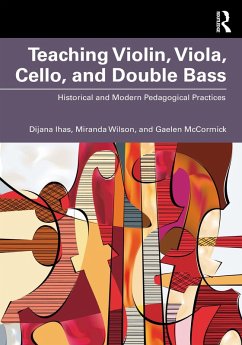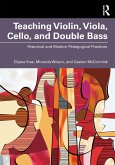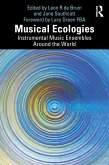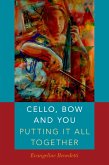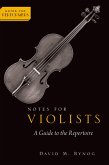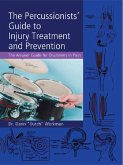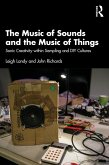Dijana Ihas, Miranda Wilson, Gaelen McCormick
Teaching Violin, Viola, Cello, and Double Bass (eBook, PDF)
Historical and Modern Pedagogical Practices
51,95 €
51,95 €
inkl. MwSt.
Sofort per Download lieferbar

26 °P sammeln
51,95 €
Als Download kaufen

51,95 €
inkl. MwSt.
Sofort per Download lieferbar

26 °P sammeln
Jetzt verschenken
Alle Infos zum eBook verschenken
51,95 €
inkl. MwSt.
Sofort per Download lieferbar
Alle Infos zum eBook verschenken

26 °P sammeln
Dijana Ihas, Miranda Wilson, Gaelen McCormick
Teaching Violin, Viola, Cello, and Double Bass (eBook, PDF)
Historical and Modern Pedagogical Practices
- Format: PDF
- Merkliste
- Auf die Merkliste
- Bewerten Bewerten
- Teilen
- Produkt teilen
- Produkterinnerung
- Produkterinnerung

Bitte loggen Sie sich zunächst in Ihr Kundenkonto ein oder registrieren Sie sich bei
bücher.de, um das eBook-Abo tolino select nutzen zu können.
Hier können Sie sich einloggen
Hier können Sie sich einloggen
Sie sind bereits eingeloggt. Klicken Sie auf 2. tolino select Abo, um fortzufahren.

Bitte loggen Sie sich zunächst in Ihr Kundenkonto ein oder registrieren Sie sich bei bücher.de, um das eBook-Abo tolino select nutzen zu können.
Teaching Violin, Viola, Cello, and Double Bass summarizes three centuries of string pedagogical treatises to create a comprehensive resource on methods and approaches to teaching all four bowed string instruments.
- Geräte: PC
- mit Kopierschutz
- eBook Hilfe
Andere Kunden interessierten sich auch für
![Teaching Violin, Viola, Cello, and Double Bass (eBook, ePUB) Teaching Violin, Viola, Cello, and Double Bass (eBook, ePUB)]() Dijana IhasTeaching Violin, Viola, Cello, and Double Bass (eBook, ePUB)51,95 €
Dijana IhasTeaching Violin, Viola, Cello, and Double Bass (eBook, ePUB)51,95 €![Musical Ecologies (eBook, PDF) Musical Ecologies (eBook, PDF)]() Musical Ecologies (eBook, PDF)38,95 €
Musical Ecologies (eBook, PDF)38,95 €![Pierre Boulez's sur Incises and its World (eBook, PDF) Pierre Boulez's sur Incises and its World (eBook, PDF)]() Peter O'HaganPierre Boulez's sur Incises and its World (eBook, PDF)43,95 €
Peter O'HaganPierre Boulez's sur Incises and its World (eBook, PDF)43,95 €![Cello, Bow and You: Putting it All Together (eBook, PDF) Cello, Bow and You: Putting it All Together (eBook, PDF)]() Evangeline BenedettiCello, Bow and You: Putting it All Together (eBook, PDF)23,95 €
Evangeline BenedettiCello, Bow and You: Putting it All Together (eBook, PDF)23,95 €![Notes for Violists (eBook, PDF) Notes for Violists (eBook, PDF)]() David M. BynogNotes for Violists (eBook, PDF)26,95 €
David M. BynogNotes for Violists (eBook, PDF)26,95 €![The Percussionists' Guide to Injury Treatment and Prevention (eBook, PDF) The Percussionists' Guide to Injury Treatment and Prevention (eBook, PDF)]() Darin "Dutch" WorkmanThe Percussionists' Guide to Injury Treatment and Prevention (eBook, PDF)51,95 €
Darin "Dutch" WorkmanThe Percussionists' Guide to Injury Treatment and Prevention (eBook, PDF)51,95 €![The Music of Sounds and the Music of Things (eBook, PDF) The Music of Sounds and the Music of Things (eBook, PDF)]() Leigh LandyThe Music of Sounds and the Music of Things (eBook, PDF)40,95 €
Leigh LandyThe Music of Sounds and the Music of Things (eBook, PDF)40,95 €-
-
-
Teaching Violin, Viola, Cello, and Double Bass summarizes three centuries of string pedagogical treatises to create a comprehensive resource on methods and approaches to teaching all four bowed string instruments.
Hinweis: Dieser Artikel kann nur an eine deutsche Lieferadresse ausgeliefert werden.
Dieser Download kann aus rechtlichen Gründen nur mit Rechnungsadresse in A, B, BG, CY, CZ, D, DK, EW, E, FIN, F, GR, HR, H, IRL, I, LT, L, LR, M, NL, PL, P, R, S, SLO, SK ausgeliefert werden.
Hinweis: Dieser Artikel kann nur an eine deutsche Lieferadresse ausgeliefert werden.
Produktdetails
- Produktdetails
- Verlag: Taylor & Francis eBooks
- Seitenzahl: 436
- Erscheinungstermin: 23. November 2023
- Englisch
- ISBN-13: 9781000970470
- Artikelnr.: 69220013
- Verlag: Taylor & Francis eBooks
- Seitenzahl: 436
- Erscheinungstermin: 23. November 2023
- Englisch
- ISBN-13: 9781000970470
- Artikelnr.: 69220013
- Herstellerkennzeichnung Die Herstellerinformationen sind derzeit nicht verfügbar.
Dijana Ihas is Professor of Music Education at Pacific University, Oregon.
Miranda Wilson is Professor of Cello at the University of Idaho.
Gaelen McCormick is Instructor of Double Bass at the University of Rochester's Eastman Community Music School.
Miranda Wilson is Professor of Cello at the University of Idaho.
Gaelen McCormick is Instructor of Double Bass at the University of Rochester's Eastman Community Music School.
Acknowledgements
Introduction
PART ONE: Violin and viola
Chapter 1: Historical treatises and approaches for violin
Essay 1: Prototype treatises: Geminiani, L. Mozart, L'abbé le fils, and their contemporaries
Essay 2: French violin school: Rode, Kreutzer, Baillot, and their disciples
Essay 3: Old German violin school: Spohr and David
Essay 4: Franco-Belgian violin school: De Bériot, Léonard, Massart, and the first modern virtuosi-composers
Essay 5: Berlin violin school: Joachim and Moser
Essay 6: Rational thinkers: Sevcík and Flesch
Essay 7: Lonely star: Lucien Capet
Essay 8: Toward artistic expertise: The Russian violin school
Essay 9: The Soviet violin school: Stolyarski, Yampol'sky, Mostras, and Yankelevich
Essay 10: The birth and rise of the American violin school: Galamian, DeLay, Gingold, and Bronstein
Essay 11: Holistic approaches: Menuhin and Havas
Essay 12: The science of expressive techniques: Demetrios Constantine Dounis
Essay 13: A synthesizing mind: Simon Fischer
Bibliography for Chapter 1
Chapter 2: Historical treatises and approaches for viola
Essay 14: Cinderella no more: Lionel Tertis
Essay 15: Virtuoso of the new solo instrument: William Primrose
Essay 16: Teaching the physicality of musicality: Karen Tuttle
Bibliography for Chapter 2
Chapter 3: Approaches and methods for beginning and intermediate students: Violin and Viola
Essay 17: Teaching as an art and science: Samuel Applebaum
Essay 18: Whole instrument approach: George Bornoff
Essay 19: Movement in action: Paul Rolland
Essay 20: Every Child Can: Shinichi Suzuki
Essay 21: Emerging string pedagogy approaches for beginning and intermediate students: Colourstrings, Milanov Method, Sassmannshaus Tradition, Wartberg, and Zweig
Bibliography for Chapter 3
Chapter 4: Applications to modern teaching: A summary of concepts and pedagogical practices
Essay 22: Teaching foundations
Essay 23: Teaching left-hand techniques
Essay 24: Teaching right-hand techniques:
Essay 25: Teaching musical expression and interpretation
Essay 26: Teaching how to practice
Bibliography for Chapter 4
PART TWO: Cello
Chapter 5: Historical treatises and approaches for cello
Essay 27: The Paris Conservatoire pedagogues: J. L. Duport, Bréval, Levasseur, Baudiot, Hus-Desforges, Vaslin
Essay 28: The Dresden School pedagogues: Romberg, Dotzauer, Kummer, and Lee
Essay 29: The etude composers: Piatti, Grützmacher, and Popper
Essay 30: The first endpin pedagogues: Davidoff, de Swert, C. Schroeder, and van der Straeten
Essay 31: The influence of physiology: Krall, Becker, and Mantel
Essay 32: Paris Conservatoire pedagogues of the twentieth century: Feuillard, Bazelaire, and Tortelier
Essay 33: Disciples of Casals: Alexanian, Eisenberg, and Bunting
Essay 34: Beyond national schools: Stutschewsky, Silva, Matz, and Aronson
Essay 35: Mind-body approaches to cello pedagogy: Sazer, Mackie, Benedetti, and de Alcantara
Essay 36: Lonely stars-cello: Pleeth, Jensen, and Chung
Bibliography for Chapter 5
Chapter 6: Approaches and methods for beginning and intermediate students: Cello
Essay 37: Suzuki-based approaches for beginning and intermediate players: Carey and Devenport
Essay 38: American approaches for beginning and intermediate players: Rowell, Potter, Young, and Watkins
Bibliography for Chapter 6
Chapter 7: Applications to modern teaching: Cello
Essay 39: Teaching foundations
Essay 40: Teaching left-hand techniques
Essay 41: Teaching right-hand techniques
Essay 42: Teaching practicing
Bibliography for Chapter 7
PART THREE: Double Bass
Chapter 8: Historical treatises and approaches for double bass
Essay 43: Moving beyond fisticuffs: Asioli, Rossi, Hause, Franke, and Gouffé
Essay 44: Italian school: Montanari, Bottesini, Caimmi, and Billè
Essay 45: Prague school: Simandl, Warnecke, and Findeisen
Essay 46: Paris Conservatoire: Labro, Verrimst, and Nanny
Essay 47: English school: White, Lotter, and Cruft
Essay 48: New directions: Montag, Streicher, and Rabbath
Essay 49. American teaching: Influence of Billè and Simandl
Bibliography for Chapter 8
Chapter 9: Approaches and methods for beginning and intermediate students: Double bass
Chapter 10: Applications to modern teaching: Double bass
Essay 50: Teaching foundations
Essay 51: Teaching left-hand techniques
Essay 52: Teaching right-hand techniques
Essay 53: Teaching practicing
Bibliography for Chapter 10
Appendix A An Overview of Historic National Schools - Violin
Selected Readings: Hidden Gems - Violin
Selected Readings: Hidden Gems - Viola
An Overview of National Schools - Violin
Appendix B Selected Pedagogical Materials: Historical and Modern Approaches in Cello Pedagogy
Selected Pedagogical Materials for Cello - Historical and Modern Approaches in Cello Pedagogy
Selected Pedagogical Materials for Cello - Beginning and Intermediate Approaches in Cello Pedagogy
Appendix C
Selected Pedagogical Materials for Double Bass
Index
Introduction
PART ONE: Violin and viola
Chapter 1: Historical treatises and approaches for violin
Essay 1: Prototype treatises: Geminiani, L. Mozart, L'abbé le fils, and their contemporaries
Essay 2: French violin school: Rode, Kreutzer, Baillot, and their disciples
Essay 3: Old German violin school: Spohr and David
Essay 4: Franco-Belgian violin school: De Bériot, Léonard, Massart, and the first modern virtuosi-composers
Essay 5: Berlin violin school: Joachim and Moser
Essay 6: Rational thinkers: Sevcík and Flesch
Essay 7: Lonely star: Lucien Capet
Essay 8: Toward artistic expertise: The Russian violin school
Essay 9: The Soviet violin school: Stolyarski, Yampol'sky, Mostras, and Yankelevich
Essay 10: The birth and rise of the American violin school: Galamian, DeLay, Gingold, and Bronstein
Essay 11: Holistic approaches: Menuhin and Havas
Essay 12: The science of expressive techniques: Demetrios Constantine Dounis
Essay 13: A synthesizing mind: Simon Fischer
Bibliography for Chapter 1
Chapter 2: Historical treatises and approaches for viola
Essay 14: Cinderella no more: Lionel Tertis
Essay 15: Virtuoso of the new solo instrument: William Primrose
Essay 16: Teaching the physicality of musicality: Karen Tuttle
Bibliography for Chapter 2
Chapter 3: Approaches and methods for beginning and intermediate students: Violin and Viola
Essay 17: Teaching as an art and science: Samuel Applebaum
Essay 18: Whole instrument approach: George Bornoff
Essay 19: Movement in action: Paul Rolland
Essay 20: Every Child Can: Shinichi Suzuki
Essay 21: Emerging string pedagogy approaches for beginning and intermediate students: Colourstrings, Milanov Method, Sassmannshaus Tradition, Wartberg, and Zweig
Bibliography for Chapter 3
Chapter 4: Applications to modern teaching: A summary of concepts and pedagogical practices
Essay 22: Teaching foundations
Essay 23: Teaching left-hand techniques
Essay 24: Teaching right-hand techniques:
Essay 25: Teaching musical expression and interpretation
Essay 26: Teaching how to practice
Bibliography for Chapter 4
PART TWO: Cello
Chapter 5: Historical treatises and approaches for cello
Essay 27: The Paris Conservatoire pedagogues: J. L. Duport, Bréval, Levasseur, Baudiot, Hus-Desforges, Vaslin
Essay 28: The Dresden School pedagogues: Romberg, Dotzauer, Kummer, and Lee
Essay 29: The etude composers: Piatti, Grützmacher, and Popper
Essay 30: The first endpin pedagogues: Davidoff, de Swert, C. Schroeder, and van der Straeten
Essay 31: The influence of physiology: Krall, Becker, and Mantel
Essay 32: Paris Conservatoire pedagogues of the twentieth century: Feuillard, Bazelaire, and Tortelier
Essay 33: Disciples of Casals: Alexanian, Eisenberg, and Bunting
Essay 34: Beyond national schools: Stutschewsky, Silva, Matz, and Aronson
Essay 35: Mind-body approaches to cello pedagogy: Sazer, Mackie, Benedetti, and de Alcantara
Essay 36: Lonely stars-cello: Pleeth, Jensen, and Chung
Bibliography for Chapter 5
Chapter 6: Approaches and methods for beginning and intermediate students: Cello
Essay 37: Suzuki-based approaches for beginning and intermediate players: Carey and Devenport
Essay 38: American approaches for beginning and intermediate players: Rowell, Potter, Young, and Watkins
Bibliography for Chapter 6
Chapter 7: Applications to modern teaching: Cello
Essay 39: Teaching foundations
Essay 40: Teaching left-hand techniques
Essay 41: Teaching right-hand techniques
Essay 42: Teaching practicing
Bibliography for Chapter 7
PART THREE: Double Bass
Chapter 8: Historical treatises and approaches for double bass
Essay 43: Moving beyond fisticuffs: Asioli, Rossi, Hause, Franke, and Gouffé
Essay 44: Italian school: Montanari, Bottesini, Caimmi, and Billè
Essay 45: Prague school: Simandl, Warnecke, and Findeisen
Essay 46: Paris Conservatoire: Labro, Verrimst, and Nanny
Essay 47: English school: White, Lotter, and Cruft
Essay 48: New directions: Montag, Streicher, and Rabbath
Essay 49. American teaching: Influence of Billè and Simandl
Bibliography for Chapter 8
Chapter 9: Approaches and methods for beginning and intermediate students: Double bass
Chapter 10: Applications to modern teaching: Double bass
Essay 50: Teaching foundations
Essay 51: Teaching left-hand techniques
Essay 52: Teaching right-hand techniques
Essay 53: Teaching practicing
Bibliography for Chapter 10
Appendix A An Overview of Historic National Schools - Violin
Selected Readings: Hidden Gems - Violin
Selected Readings: Hidden Gems - Viola
An Overview of National Schools - Violin
Appendix B Selected Pedagogical Materials: Historical and Modern Approaches in Cello Pedagogy
Selected Pedagogical Materials for Cello - Historical and Modern Approaches in Cello Pedagogy
Selected Pedagogical Materials for Cello - Beginning and Intermediate Approaches in Cello Pedagogy
Appendix C
Selected Pedagogical Materials for Double Bass
Index
Acknowledgements
Introduction
PART ONE: Violin and viola
Chapter 1: Historical treatises and approaches for violin
Essay 1: Prototype treatises: Geminiani, L. Mozart, L'abbé le fils, and their contemporaries
Essay 2: French violin school: Rode, Kreutzer, Baillot, and their disciples
Essay 3: Old German violin school: Spohr and David
Essay 4: Franco-Belgian violin school: De Bériot, Léonard, Massart, and the first modern virtuosi-composers
Essay 5: Berlin violin school: Joachim and Moser
Essay 6: Rational thinkers: Sevcík and Flesch
Essay 7: Lonely star: Lucien Capet
Essay 8: Toward artistic expertise: The Russian violin school
Essay 9: The Soviet violin school: Stolyarski, Yampol'sky, Mostras, and Yankelevich
Essay 10: The birth and rise of the American violin school: Galamian, DeLay, Gingold, and Bronstein
Essay 11: Holistic approaches: Menuhin and Havas
Essay 12: The science of expressive techniques: Demetrios Constantine Dounis
Essay 13: A synthesizing mind: Simon Fischer
Bibliography for Chapter 1
Chapter 2: Historical treatises and approaches for viola
Essay 14: Cinderella no more: Lionel Tertis
Essay 15: Virtuoso of the new solo instrument: William Primrose
Essay 16: Teaching the physicality of musicality: Karen Tuttle
Bibliography for Chapter 2
Chapter 3: Approaches and methods for beginning and intermediate students: Violin and Viola
Essay 17: Teaching as an art and science: Samuel Applebaum
Essay 18: Whole instrument approach: George Bornoff
Essay 19: Movement in action: Paul Rolland
Essay 20: Every Child Can: Shinichi Suzuki
Essay 21: Emerging string pedagogy approaches for beginning and intermediate students: Colourstrings, Milanov Method, Sassmannshaus Tradition, Wartberg, and Zweig
Bibliography for Chapter 3
Chapter 4: Applications to modern teaching: A summary of concepts and pedagogical practices
Essay 22: Teaching foundations
Essay 23: Teaching left-hand techniques
Essay 24: Teaching right-hand techniques:
Essay 25: Teaching musical expression and interpretation
Essay 26: Teaching how to practice
Bibliography for Chapter 4
PART TWO: Cello
Chapter 5: Historical treatises and approaches for cello
Essay 27: The Paris Conservatoire pedagogues: J. L. Duport, Bréval, Levasseur, Baudiot, Hus-Desforges, Vaslin
Essay 28: The Dresden School pedagogues: Romberg, Dotzauer, Kummer, and Lee
Essay 29: The etude composers: Piatti, Grützmacher, and Popper
Essay 30: The first endpin pedagogues: Davidoff, de Swert, C. Schroeder, and van der Straeten
Essay 31: The influence of physiology: Krall, Becker, and Mantel
Essay 32: Paris Conservatoire pedagogues of the twentieth century: Feuillard, Bazelaire, and Tortelier
Essay 33: Disciples of Casals: Alexanian, Eisenberg, and Bunting
Essay 34: Beyond national schools: Stutschewsky, Silva, Matz, and Aronson
Essay 35: Mind-body approaches to cello pedagogy: Sazer, Mackie, Benedetti, and de Alcantara
Essay 36: Lonely stars-cello: Pleeth, Jensen, and Chung
Bibliography for Chapter 5
Chapter 6: Approaches and methods for beginning and intermediate students: Cello
Essay 37: Suzuki-based approaches for beginning and intermediate players: Carey and Devenport
Essay 38: American approaches for beginning and intermediate players: Rowell, Potter, Young, and Watkins
Bibliography for Chapter 6
Chapter 7: Applications to modern teaching: Cello
Essay 39: Teaching foundations
Essay 40: Teaching left-hand techniques
Essay 41: Teaching right-hand techniques
Essay 42: Teaching practicing
Bibliography for Chapter 7
PART THREE: Double Bass
Chapter 8: Historical treatises and approaches for double bass
Essay 43: Moving beyond fisticuffs: Asioli, Rossi, Hause, Franke, and Gouffé
Essay 44: Italian school: Montanari, Bottesini, Caimmi, and Billè
Essay 45: Prague school: Simandl, Warnecke, and Findeisen
Essay 46: Paris Conservatoire: Labro, Verrimst, and Nanny
Essay 47: English school: White, Lotter, and Cruft
Essay 48: New directions: Montag, Streicher, and Rabbath
Essay 49. American teaching: Influence of Billè and Simandl
Bibliography for Chapter 8
Chapter 9: Approaches and methods for beginning and intermediate students: Double bass
Chapter 10: Applications to modern teaching: Double bass
Essay 50: Teaching foundations
Essay 51: Teaching left-hand techniques
Essay 52: Teaching right-hand techniques
Essay 53: Teaching practicing
Bibliography for Chapter 10
Appendix A An Overview of Historic National Schools - Violin
Selected Readings: Hidden Gems - Violin
Selected Readings: Hidden Gems - Viola
An Overview of National Schools - Violin
Appendix B Selected Pedagogical Materials: Historical and Modern Approaches in Cello Pedagogy
Selected Pedagogical Materials for Cello - Historical and Modern Approaches in Cello Pedagogy
Selected Pedagogical Materials for Cello - Beginning and Intermediate Approaches in Cello Pedagogy
Appendix C
Selected Pedagogical Materials for Double Bass
Index
Introduction
PART ONE: Violin and viola
Chapter 1: Historical treatises and approaches for violin
Essay 1: Prototype treatises: Geminiani, L. Mozart, L'abbé le fils, and their contemporaries
Essay 2: French violin school: Rode, Kreutzer, Baillot, and their disciples
Essay 3: Old German violin school: Spohr and David
Essay 4: Franco-Belgian violin school: De Bériot, Léonard, Massart, and the first modern virtuosi-composers
Essay 5: Berlin violin school: Joachim and Moser
Essay 6: Rational thinkers: Sevcík and Flesch
Essay 7: Lonely star: Lucien Capet
Essay 8: Toward artistic expertise: The Russian violin school
Essay 9: The Soviet violin school: Stolyarski, Yampol'sky, Mostras, and Yankelevich
Essay 10: The birth and rise of the American violin school: Galamian, DeLay, Gingold, and Bronstein
Essay 11: Holistic approaches: Menuhin and Havas
Essay 12: The science of expressive techniques: Demetrios Constantine Dounis
Essay 13: A synthesizing mind: Simon Fischer
Bibliography for Chapter 1
Chapter 2: Historical treatises and approaches for viola
Essay 14: Cinderella no more: Lionel Tertis
Essay 15: Virtuoso of the new solo instrument: William Primrose
Essay 16: Teaching the physicality of musicality: Karen Tuttle
Bibliography for Chapter 2
Chapter 3: Approaches and methods for beginning and intermediate students: Violin and Viola
Essay 17: Teaching as an art and science: Samuel Applebaum
Essay 18: Whole instrument approach: George Bornoff
Essay 19: Movement in action: Paul Rolland
Essay 20: Every Child Can: Shinichi Suzuki
Essay 21: Emerging string pedagogy approaches for beginning and intermediate students: Colourstrings, Milanov Method, Sassmannshaus Tradition, Wartberg, and Zweig
Bibliography for Chapter 3
Chapter 4: Applications to modern teaching: A summary of concepts and pedagogical practices
Essay 22: Teaching foundations
Essay 23: Teaching left-hand techniques
Essay 24: Teaching right-hand techniques:
Essay 25: Teaching musical expression and interpretation
Essay 26: Teaching how to practice
Bibliography for Chapter 4
PART TWO: Cello
Chapter 5: Historical treatises and approaches for cello
Essay 27: The Paris Conservatoire pedagogues: J. L. Duport, Bréval, Levasseur, Baudiot, Hus-Desforges, Vaslin
Essay 28: The Dresden School pedagogues: Romberg, Dotzauer, Kummer, and Lee
Essay 29: The etude composers: Piatti, Grützmacher, and Popper
Essay 30: The first endpin pedagogues: Davidoff, de Swert, C. Schroeder, and van der Straeten
Essay 31: The influence of physiology: Krall, Becker, and Mantel
Essay 32: Paris Conservatoire pedagogues of the twentieth century: Feuillard, Bazelaire, and Tortelier
Essay 33: Disciples of Casals: Alexanian, Eisenberg, and Bunting
Essay 34: Beyond national schools: Stutschewsky, Silva, Matz, and Aronson
Essay 35: Mind-body approaches to cello pedagogy: Sazer, Mackie, Benedetti, and de Alcantara
Essay 36: Lonely stars-cello: Pleeth, Jensen, and Chung
Bibliography for Chapter 5
Chapter 6: Approaches and methods for beginning and intermediate students: Cello
Essay 37: Suzuki-based approaches for beginning and intermediate players: Carey and Devenport
Essay 38: American approaches for beginning and intermediate players: Rowell, Potter, Young, and Watkins
Bibliography for Chapter 6
Chapter 7: Applications to modern teaching: Cello
Essay 39: Teaching foundations
Essay 40: Teaching left-hand techniques
Essay 41: Teaching right-hand techniques
Essay 42: Teaching practicing
Bibliography for Chapter 7
PART THREE: Double Bass
Chapter 8: Historical treatises and approaches for double bass
Essay 43: Moving beyond fisticuffs: Asioli, Rossi, Hause, Franke, and Gouffé
Essay 44: Italian school: Montanari, Bottesini, Caimmi, and Billè
Essay 45: Prague school: Simandl, Warnecke, and Findeisen
Essay 46: Paris Conservatoire: Labro, Verrimst, and Nanny
Essay 47: English school: White, Lotter, and Cruft
Essay 48: New directions: Montag, Streicher, and Rabbath
Essay 49. American teaching: Influence of Billè and Simandl
Bibliography for Chapter 8
Chapter 9: Approaches and methods for beginning and intermediate students: Double bass
Chapter 10: Applications to modern teaching: Double bass
Essay 50: Teaching foundations
Essay 51: Teaching left-hand techniques
Essay 52: Teaching right-hand techniques
Essay 53: Teaching practicing
Bibliography for Chapter 10
Appendix A An Overview of Historic National Schools - Violin
Selected Readings: Hidden Gems - Violin
Selected Readings: Hidden Gems - Viola
An Overview of National Schools - Violin
Appendix B Selected Pedagogical Materials: Historical and Modern Approaches in Cello Pedagogy
Selected Pedagogical Materials for Cello - Historical and Modern Approaches in Cello Pedagogy
Selected Pedagogical Materials for Cello - Beginning and Intermediate Approaches in Cello Pedagogy
Appendix C
Selected Pedagogical Materials for Double Bass
Index
